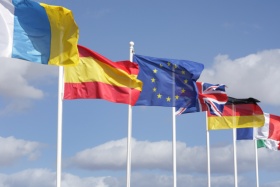Europe looks to smart meters to hit energy target

The European Commission is betting on smart metering and tougher power consumption rules for electronics to help get Europe back on course to meet its energy-efficiency target.

The European Commission has formulated a plan to introduce smart meters and tougher power consumption rules in Europe.
According to the Commission, the EU will achieve only half of its target of improving energy efficiency by 20 percent by 2020, if it continues "business as usual". To rectify this, the Commission adopted a new plan on Wednesday to push businesses, industry and consumers to lower energy consumption.
"Despite progress, our estimates show that we need a further decisive and co-ordinated action on energy efficiency," said energy commissioner Günther Oettinger. "[The plan] paves the way for the longer-term policies needed to achieve a decarbonised and resource-efficient economy by 2050 and to place the EU at the forefront of innovation."
While the wide-ranging Energy Efficiency Plan 2011 (PDF) focuses on renovating public-sector buildings to improve energy efficiency, it also looks for improvements via increased consumer use of smart meters and stricter electronics standards.
"Smart grids and smart meters will serve as a backbone for smart appliances, adding to the energy savings obtained by buying more energy-efficient appliances," the Commission said in its plan.
Smart-meter target
The Commission has set a target of 80 percent of consumers to have smart meters by 2020. Under current EU legislation, consumers should already be frequently informed about energy consumption of electricity, gas, heating and cooling and hot water.
In practice, this has not yet been implemented properly, said the Commission, which pledged to make sure consumers get up-to-date energy consumption information through smart metering and "trustworthy advice on the costs and benefits of energy efficiency investments".
A number of smart-metering efforts are underway in the UK. On Wednesday, O2 announced that it has signed a multimillion-pound contract with smart meter operations company G4S Utility Services to provide SIM cards for smart meters.
In addition, British Gas is involved in a £54m trial in the north-east with CE Electric UK, Durham University and the engineering consultancy EA Technology to find 14,000 volunteers to have smart meters installed. The utility has rolled out approximately 250,000 smart meters over two years and is one of the largest suppliers of smart meters in the country, a British Gas spokesman said. The total number of electricity meters in the UK is over 45 million, he added.
The Commission will also set stricter energy consumption standards on computing equipment and other technologies. Member states will supply European small businesses with information on energy efficiency, for example, with criteria for subsidies to upgrade machinery and tax rebates.
The plan also requires public authorities to refurbish at least 3 percent of the floor area in their buildings each year, to boost energy performance levels.
Get the latest technology news and analysis, blogs and reviews delivered directly to your inbox with ZDNet UK's newsletters.